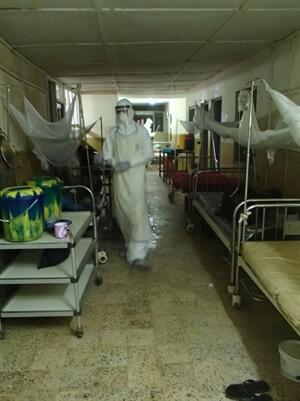
As West African countries continue to fight the outbreak of Ebola, LSTM’s Dr Tim O’Dempsey has returned from Sierra Leone where he has been treating Ebola patients at a Ministry of Health facility whilst seconded to the World Health Organization (WHO).
The Ebola virus disease (EVD) is a viral haemorragic fever that so far has killed over 930 people[1] during this latest outbreak, across Sierra Leone, Liberia, Nigeria and Guinea where the outbreak was first reported in March. Sierra Leone currently has the highest number of recorded Ebola cases and is struggling to manage the outbreak. Meanwhile Liberia has declared a state of emergency.
Dr O’Dempsey, a Senior Lecturer in Tropical Medicine at LSTM, was approached by his LSTM colleague Dr Tom Fletcher, also seconded to WHO, to lead the WHO clinical response at the government’s main Ebola treatment centre in Kenema, located in eastern Sierra Leone.
When he arrived at the start of his 4 week secondment there was a critical shortage of nursing staff. This situation was further exacerbated over subsequent weeks due to an alarmingly high infection rate among hospital staff and, tragically, several deaths including the senior nurse and doctor in charge of the Lassa Fever Treatment Centre, located at Kenema hospital.
Dr O’Dempsey said: “Conditions on the wards were very challenging with a case load of 40 to 60 patients, only a handful of medical and nursing staff and difficulties in obtaining supplies of essential medicines and protective equipment. The presence of the Ebola treatment centre had a direct impact on the provision of medical and surgical services at the government hospital. Adult medical and surgical wards were deserted. This was a matter of great concern to the local community and resulted in a number of angry protests.”
The case fatality rate for Ebola at the Kenema treatment centre is estimated to be between 40-60%. However it is difficult to provide an accurate figure, due to inconsistencies in reporting and record keeping. There is also evidence that many undocumented deaths are occurring, particularly in rural communities where entire families are being wiped out. Therefore the overall mortality rate is likely to be higher than estimates based on hospital data. Nevertheless, many patients do survive, particularly those who present for care at an early stage in their illness. ‘It is wonderful to see them recover and walk away from the hospital’, said Dr O’Dempsey.
While at Kenema, Dr O’Dempsey encountered two of his former students from LSTM’s Diploma in Tropical Medicine & Hygiene: Dr Takuya Adachi (DTM&H 2006) and Dr Catherine Houlihan (DTM&H 2007). ‘I felt very honoured to be working alongside such excellent LSTM graduates’ said Dr O’Dempsey. He also visited the MSF Ebola treatment centre in Kailahun where he met Anya Wolz, a 2013 graduate of LSTM’s Diploma in Humanitarian Assistance, who was coordinating the MSF response.
The current outbreak is unprecedented both in size, distribution and complexity and will require a sustained regional and international response for many months to come. Ebola’s impact on fragile health systems goes beyond a direct effect on morbidity and mortality, it is also affecting access to healthcare for people with numerous other common diseases as well as maternal health services. The true impact of the epidemic is likely to be far more severe than is apparent from the disease specific morbidity and mortality data.
Clinical staff at LSTM are ideally placed to support WHO and ministries of health in responding to the outbreak. LSTM Lecturer, Dr Tom Fletcher, who returned from his WHO secondment to Conakry, Guinea and more recently in Sierra Leone, where he coordinated the WHO clinical response, is about to return to the region to further assist with case management and data collection.
Now that the WHO has declared the current Ebola outbreak an ‘international public health emergency’, LSTM staff and former students will continue to contribute to the frontline response.
[1] As per 7 August 2014